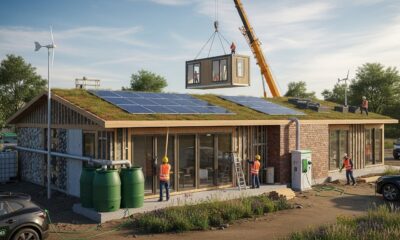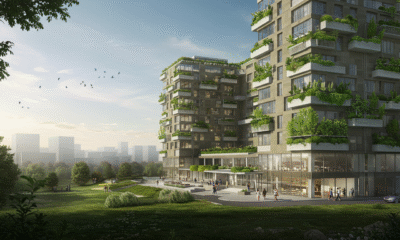

Energy
Energy Management Mastery: 4 Tips for Green Property Owners
More people than ever are interested in owning green buildings. The market for eco-friendly buildings is projected to be worth over $1.16 billion by 2032.
There are a lot of major benefits of having an eco-friendly building. In addition to being good for the planet, they are also more cost-effective.
There are a lot of things that you need to keep in mind when you are trying to be an eco-friendly property owner. One of the most important things is that you have to make it a priority to ensure your property is as energy-efficient as possible. This can be a challenge especially with older homes.
Energy Management is one key element in property leadership that ensures buildings run effectively, sustainably and cost-effectively. Regardless of the type of property you are managing, may it be commercial, residential and industrial properties – mastering energy will save money, increase value for your property and have a lesser environmental impact according to experts in the field resustain.com. The following are the four crucial tips for property leaders to succeed in energy management.
1. Conduct Comprehensive Energy Audits
Knowing energy consumption on your property and looking for potential areas to improve is the initial step towards a successful management in energy. Do detailed energy audits to evaluate the level of energy consumption in your buildings. The said audit must cover HVAC systems, lighting, insulation and all other energy consuming processes. Look for professional auditors to get information on the steps that can be taken in detail and which should also have specific, actionable measures recommended for improving energy effectively. The application of the findings from those audits may result in a huge energy savings and boost building performance.
2. Invest in Energy-Efficient Technologies
Energy efficiency can be more doable and can be cheaper than before through the updates in technology. To lessen the amount of energy and operating costs having the new technologies are needed. This might involve changing to LED lights or having a smart thermostat or having the latest HVAC systems that have good energy management capabilities. LED lights use 75% less energy and last up to 25 times longer than incandescent bulbs. In order to become more independent from regular types of energy and lessen carbon release, think about having clean energy sources like solar panels or wind turbines.
3. Implement a Building Automation System (BAS)
To have a comfortable temperature inside your properties that is where BAS plays an important role in energy efficiency. It can manage lighting, HVAC and other systems in line with occupancy levels, time of day and so much more, making sure that wasting energy is avoided by this means. These systems significantly save energy since they automate the control of the building unit, which makes it a more effective strategy for managing it. Also, it can offer useful information and analysis about the operation of your building, having continuous improvements in energy use.
4. Foster an Energy-Conscious Culture
Energy management is not just about the technology and systems used in your buildings, but people too. It is necessary to develop the energy-conscious culture among tenants, employees and maintenance staff. Inform them of how conserving energy is critical and that their individual efforts can bring change. Promoting energy-saving behaviors, including switching off the lights when not in use and adjusting thermostats to minimize power wastage, and reporting gaps or issues that may increase consumption. Your energy management goals can benefit greatly from an engaged community.
Conclusion
Energy management is best achieved through a variety of strategies that incorporate technical, operational and cultural elements. By performing comprehensive energy audits, investing in efficient technologies to reduce consumption of energy, implementing building automation systems, and nurturing an energy-conscious culture – With these, property leaders can save a lot on their utility bills hence increase the value of their investment while conserving natural resources. Adopting the above strategies does not only have a positive impact on your bottom line but also makes your properties as leaders in energy management and sustainability.


 Environment12 months ago
Environment12 months agoAre Polymer Banknotes: an Eco-Friendly Trend or a Groundswell?

 Features11 months ago
Features11 months agoEco-Friendly Cryptocurrencies: Sustainable Investment Choices

 Features12 months ago
Features12 months agoEco-Friendly Crypto Traders Must Find the Right Exchange

 Energy11 months ago
Energy11 months agoThe Growing Role of Solar Panels in Ireland’s Energy Future





























